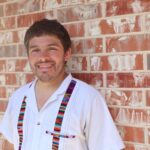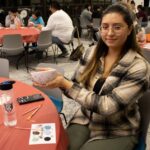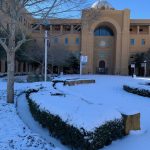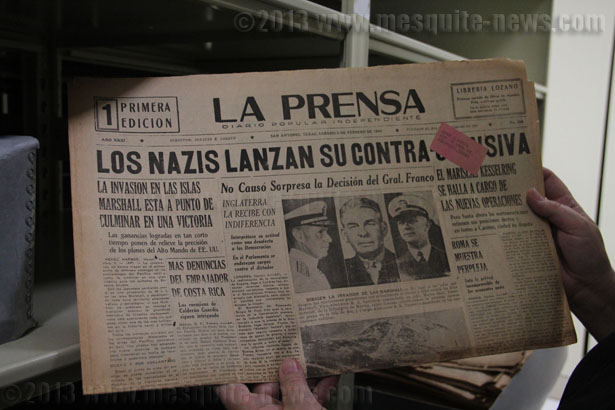
By Rossi Ramirez
Texas A&M-San Antonio has launched a special collections library housing rare, fragile, and unique materials ranging from books, research papers, archives and photographs related to Texas history. The special collections is currently located at Brook City-Base Campus in Room 164.
University Librarian Stefanie Wittenbach said the start of the special collections library will add another dimension for research and provide primary resources that the university hasn’t offered before, emphasizing that special collections can hold vital meaning for the community and the world of learning.
This institution’s special collections library began with regional donations. It contains the first issues of La Prensa, San Antonio’s bilingual family-owned newspaper and magazines dating back to the 1900s; historian and author Robert Thonhoff’s journals, books, and collections; and university documents that record the growth and development of the only public university on the South Side of San Antonio.
Once archived this summer, students, faculty, and the community will have the opportunity to use the special collections for research. The archive will give the community a chance to see and touch things from many years ago, Wittenbach said.
The collection will offer “a way to transport yourself to a different time period and live it in a way that we can’t get by just reading a book.”
Most campuses in the Texas A&M University System offer some type of special collections materials, Wittenbach said. The system has 12 universities spread across Texas.
Cushing Memorial Library & Archives on the campus of Texas A&M-College Station houses the largest special collections archive in the A&M System.
Larry Mitchell, director of Cushing Memorial Library & Archives, said in a phone interview that special collections have to be significant in some way and are valuable research tools.
“Special collections libraries preserve items in their original condition and have become important for research,” he said.
Launching a special collections comes with certain challenges.
Librarian Rolando Casias of the San Antonio Public Library said in a phone interview that the organization, preservation, and conditions of special collections require preservation and security.
Temporary archivist will organize, process materials
Wittenbach plans to hire a temporary archivist this summer to help organize and process the special collections. The archivist will look at the conditions of the collections to assess whether they may be handled or are too fragile to be used.
Funding is needed to buy archival quality boxes, folders and other storage items to help preserve and secure the collections.
“Many of these materials are fragile, so they need special housing conditions, stable temperature, and certain humidity levels and fire protection,” Wittenbach said.
The building at Brooks Campus, leased by the university and formerly occupied by the U.S. Air Force, does not offer these special conditions, but Wittenbach’s goal is to find a donor to build a separate library and archives/special collection facility on Main Campus.
“An archivist always thinks about something that needs to be documented for the history of the university,” Wittenbach said during a tour of the university archive.
Primary sources, documents that are created at the time of the event, are important to supporting research,” Wittenbach explained.
During a recent tour of the university collections, Wittenbach opened boxes holding university records and correspondence, a ribbon cutting from the first academic and administrative building, a hard hat from the construction process, and commencement ceremony records—a few of the items the archive currently holds.
The university is currently working with the records management program to keep track with all departments to keep documents that will be placed in the archive. Wittenbach said that the A&M System notifies the system schools what documents created in the course of university must be retained for historical purposes or destroyed for legal reasons.
She hopes to keep the archive growing with the help of students and faculty.
“Now that we are in a digital age we need to figure a way to collect official documents that are available only electronically,” Wittenbach said.
Robert Thonhoff collection
Retired Karnes County judge and educator Robert Thonhoff recently donated his research papers, journals and books to Texas A&M-San Antonio.
Thonhoff was invited to the opening of Picasso, Amigos & Contemporaneos exhibit last year at Main Campus where he met history professor Amy Porter who encouraged him to donate his materials to the archive.
Thonhoff, well known for his research and writing on Spanish Texas history, is a five-time winner of the prestigious Presidio La Bahía Award, given annually by the Sons of the Republic of Texas for best works on the Spanish colonial history of Texas.
He is also the recipient of the History Award Medal of the National Society,from the Daughter’s of the American Revolution, given “for outstanding contribution to American history.”
“I was searching for a repository for my materials that I have gathered for over 60 years,” Thonhoff said over a telephone interview. “I was sold on the merits of the A&M System for all its qualities of excellence. Not only do (A&M-San Antonio) professors that we knew impart knowledge but they also build character in students.”
Thonhoff said he hopes his collection will bring research opportunities and add new dimensions to the Spanish Colonial history of Texas.
“Much has yet to be learned and written about the exciting and meaningful period of Spanish Colonial Texas history…my books and research materials will help fill this void.”
The donation, he said, will compliment the scholarship fund established for deserving students pursuing a master’s degree in history at this university .
The scholarship fund is in memory and honor of Margaret Lou Thonhoff Hensley, Thonhoff’s daughter who died in a tragic automobile accident April 25, 2012. He has also donated a complete set of his books and publications to the university library in memory of his daughter.
La Prensa newspaper collection
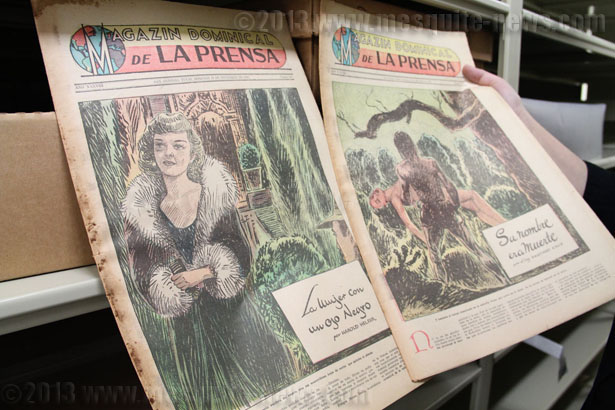
Tino Duran, publisher of La Prensa newspaper has worked with Texas A&M-San Antonio since the early development of this university. To the archive, he has donated issues of La Prensa newspaper and magazines dating back to the 1900s. Established in 1913 as a Spanish daily language newspaper, it is owned and operated by members of the Duran Family, including daughter and editor Nina Duran.
”I feel close to A&M-San Antonio,” Duran said in a phone interview. The collection will contribute and enhance education opportunities, he said, and the newspaper is “an education in itself.”
In the future, Wittenbach plans to add collections related to the history of San Antonio and South Texas.
This campus’ library opened its doors in October 2009. Prior, limited library services were offered by librarians and staff at Palo Alto College and Texas A&M-Kingsville, Wittenbach said.
Now located on the permanent campus at 1 University Way, the library plans to expand to a new building in 2014, doubling the space available and adding a small special collections reading room.
For more information on the special collection library, contact Wittenbach at 210-784-1501, or email stefanie.wittenbach@tamusa.tamus.edu.

